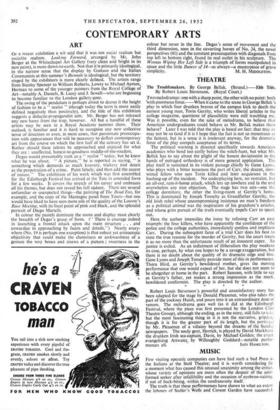THEATRE
Two melodramas: one with a sharp point, the other with no point: both With enormous force.—When it came to the scene in George Bellak 's play in which four drunken bravos of the campus kick to death the earnest young man, Torin Gerrity, who writes liberal articles in the college magazine, questions of plausibility were still troubling me. Was it possible, even for the sake of melodrama, to believe that American undergraduates could behave as Mr. Bellak makes them behave? Later I was told that the play is based on fact: that may or may not be so (and if it is I hope that the fact is not so monstrous as the fiction), but in a sense it is irrelevant anyway, for the dramatic force of the play compels acceptance of its terms.
The political warning is directed specifically towards American academics who bend too easily before the witch-hunt, but what Mr. Bellak has to say about the plight of the honest deviationist in the hands of outraged orthodoxy is of more general application. The play itself is sustained in its violent passage chiefly by Gene Lyons, who plays with a bitter tenseness the part of Carr, the decent, slow- witted fellow who sees Torin killed and later acquiesces in the hushing-up of the incident. No underplaying here, no restraint, but an all-out, ram-it-home attack, which lets up nowhere and in the end overwhelms any nice objection. The stage has two sets—one the college dormitory, the other the living-room at Gerrity's home. This is dominated by Joseph Tomelty as. Grandfather Gerrity, the old Irish rebel whose uncompromising insistence on man's freedom as a political animal was the inspiration of his grandson's articles, and whose grim pursuit of the truth eventually impels Carr to speak out.
Here the author intensifies the irony by refusing Carr an easy triumph: the four killers, who have apparently the confidence of the police and the college authorities, immediately confess and implicate Carr. During the subsecnient farce of a trial Carr- does his best to state the true reasons for the murder of Gerrity, but the court treats it as no more than the unfortunate result of an innocent caper. So justice is exiled. As an indictment of illiberalism the play weakens its case, perhaps, by what one hopes to be a savage exaggeration, but there is no doubt about the quality of its dramatic edge and bite. Gene Lyons and Joseph Tomelty provide most of this in performance. Thora Hird, as Gerrity's bewildered mother, gives the moving performance that one would expect of her, but she does not seem to be altogether at home in the part. Robert Sansom, with little to say as Gerrity's father, yet makes a strong impression as the meek, bewildered conformist. The play is directed by the author.
Robert Louis Stevenson's powerful and unsatisfactory story has been adapted for the stage by Donald Pleasence, who also takes the part of the cockney Huish, and pours into it an extraordinary dose of venom. The melodrama goes well (as it did at the Edinburgh Festival, where the piece was first presented by the London Clue Theatre Group), although the ending, as in the story, still falls to b.b. but the most fascinating thing in it is not the narrative, gripp.0_. though it is for the greater part of its length, but the portn...y.:1 by Mr. Pleasence of a villainy beyond the dreams of the Sundt:: newspapers. The seedy gent, Herrick, is played by David Markham: the drunken Irish sea-captain, Davis, by Michael Golden; the cruel. evangelising Attwatez. by Willoughby Goddard—notable perfor-


































 Previous page
Previous page